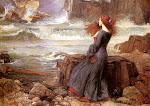When I began reading Coriolanus, I kept thinking: dear god, how am I ever going to relate this downward pride spiral to a comedy about being shipwrecked and a sonnet about Cupid? I thought that if these works were written close enough together, which they were, the motifs within them would reveal something new and exciting about the over-researched William Shakespeare. I cursed psychology--the science that taught me that works of literature reveal more about the authors than they do anything else--for leading me astray. Then, four warm potato skins later, I began The Tempest and I kept thinking: thank god, there are parallels, there are parallels, oh, the parallels!
So before I reveal my carefully composed motif, I am going to share with you the other things I’ve found, because, quite frankly, I think they’re cool, and I am the one with the power to push the “submit button”.
Pride.
Ah yes, It is Coriolanus’ pride that gets him exiled and Prospero’s lack of it that gets him exiled. And yes, they were both exiled. Coriolanus is loved by the nobles and snubs the common people and the common people show him who is boss. He does return with a vengeance, but ends up getting stabbed, so his pride must be blamed for at least one gapping stab wound. Prospero is loved by his people, but he neglects his state, and the state (led by his brother) exile him. Twelve years later, Prospero shows them up. Neither of them learn anything--the major difference being that Prospero gets to be a duke again and Coriolanus resolves one issue only to be taken down by another variation of the same issue.
The moral with pride is always pretty clear, have some, but don’t flaunt it. Put these two characters together and you have a foil that gets the point across. Obviously, things worked out better for Prospero, but he was written into a comedy--Coriolanus was going to get killed no matter what--the curse of being a tragic hero.
Coriolanus and Prospero.
These two men are so dissimilar, yet so strangely connected. I know that plenty of scholars have pointed out that Prospero was Shakespeare’s way of saying goodbye to the arts. He gives up his magic, in the final line of the epilogue he asks that the audience, “Let your indulgences set me free.” In other words, he was done writing and begging them to set him free. The Tempest was Shakespeare’s last play and it was his goodbye, Prospero is very clearly the embodiment of Shakespeare. In Act 4, Scene 1, Prospero says, “Be cheerful, sir. Our revels now are ended. These our actors, As I foretold you, were all spirits and Are melted into air, into thin air.” Prospero, of course, talks of a performance during the scene, but the quote could easily be applied to his last performance as a playwright.
If Prospero is Shakespeare’s fond farewell, then Coriolanus is his last angry tirade at an ignorant public. Let’s face it, Shakespeare was a smart guy and he probably resented having to dumb down his work to sell tickets. Coriolanus, his last tragedy, is extremely unpopular, why? Because there are no redeeming qualities to be found, it is all evil, war and pride. There are no fools, very view characters without flaw and it does not leave you feeling good in anyway. The steady stream of hate constantly aimed at the Roman public probably offended a groundling or two. Coriolanus is a proud man, who resents the need of approval from people he thinks beneath him. He is a master soldier, and resents having to flaunt his wounds for the public’s affection. In Act 4, Scene 5, a serving man talks of war and peace, “ Why, then we shall have a stirring world again. This peace is nothing but to rust iron, increase tailors, and breed ballad-makers.” I’m sure that an artist like Shakespeare, resented having to be a ballad-maker, to entertain a bored populace-- Coriolanus was Shakespeare’s way of saying this to the public…not that many of them say it.
There are so many other paralleled things that I wish I had time to research further like: the use of fire in Coriolanus and water in The Tempest and the use of them both in the sonnet, the appearance of Roman gods and other divine creatures in all three works, the similarities between Menenius (Coriolanus’ advisor) and Gonzalo (Prospero’s advisor), the almost exact likeness of the Tribunes, Sicinius and Brutus (in Coriolanus) and Sebastian and Antonio (in The Tempest), and of course why all of these repeated traits and words were stuck in the Bard’s head…
Alas, I am only a high school senior, and I only have so much patience.
Thus, I am about to reveal THE FINAL MOTIF. In my next post.
Tuesday, June 2, 2009
Subscribe to:
Post Comments (Atom)



No comments:
Post a Comment